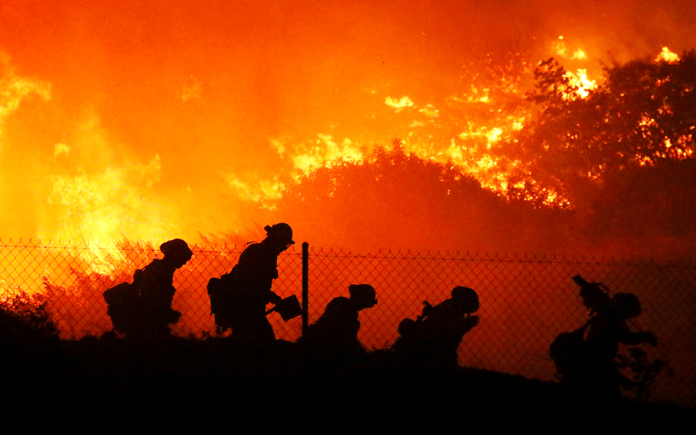
By Fire Chief Sam DiGiovanna
As fire officials, we preach this message every year “this will be our worst fire season ever!” Though we were not completely spared of wildfires, we have dodged the bullet the past two years of significant wildfires in Southern California. The third year won’t be a charm, especially with all the vegetation growing from recent rains.
When we say “this will be the worst fire season ever” it’s easy to understand how the average person tunes out our messages. So how can we convey the dangers of the impending wildland fire season in a way that commands the public’s attention and gets you to believe what we say?
Here’s a simple, illustrative way to explain it:
Take a 5-gallon can of gasoline and place it in your garage this year. Do it again next year. Every year your garage doesn’t burn, add another 5-gallon can of gasoline. After 5–10 years, you’ll have 25–50 gallons of gasoline in the garage. Although you’ve escaped those years without experiencing a fire, when one comes, it will be much worse than it was before you started to store the gasoline. It will burn with tremendous heat, spread at a rapid rate and move quickly out of control, threatening any exposures nearby.
The same happens with the fuels (vegetation) in our hillsides. Every year an area does not burn, more fuels grow. Even more so with all the rain we have received. Eventually the hills will burn — and now the fuel load is extremely full, explosive even. Under these conditions, fire will burn with intensity and spread rapidly — just like if you stored additional fuel (gasoline) in your garage each year.
The public often points to rainy winters and relief from drought conditions as a reason not to fear wildland fires in the summer. Unfortunately, the opposite is true. Our recent winter rains have doubled and even tripled the fuels in our hillsides. As the rain ebbs, the heat picks up and the winds start, all that green vegetation quickly turns to fuel.
And all of this is happening long before Santa Ana and Diablo winds begin to blow. We all know what happens when those strong, dry winds hit.
May is Wildfire Awareness Month. And May 6th is Wildfire Prevention Day. Will this year be the worst fire season ever? Time will tell. None the less, it is our responsibility to get out in front of our communities and explain the threat that is looming ahead and when we say it, we mean it – “This will be our worst fire season ever!”
Here is some safety information to use and share with your community:
Protecting the Most Valuable Parts of your Home: https://lnkd.in/gAKaS3jR
Wildfire Season is Coming Are You Prepared? https://lnkd.in/gT_Ba6zf
When It’s Time to Evacuate: https://lnkd.in/gHG2CWCZ













































